#just venting about my frustration with responses to meta analysis
Explore tagged Tumblr posts
Text
Sometimes this fandom annoys the hell out of me because I see takes from good places but that are just,,, I don’t know. They just falsely place reactions.
I saw a post saying people were being unfair to Baghs over the imprisonment idea, saying that “oh if one of the fan favorites like Phil or forever suggested it you all would agree with them” which just fundamentally misplaces why so many people disagree with it.
I’m not going to say there’s no sexist responses, but I would counter this take by saying
A. It was already suggested by a “fan favorite” character (BBH) and people still disagreed with locking up q!cellbit then
B. Most people are against locking him up because of our previous knowledge of cellbit’s lore that his prison trauma would just make him worse
I just hate how sometimes so many people jump to other assumptions about takes and how they reflect on people rather than any other explanation. There is a distrust in discussion that leads to everyone assuming ulterior motives and it just makes it difficult to want to post anything.
#qsmp#not trying to start anything#just slightly annoyed#no hate to anyone specific#just venting about my frustration with responses to meta analysis#let people argue in good faith at least please#cellbit#badboyhalo#nova.txt#baghera jones#bagi
32 notes
·
View notes
Text
Ok so vent post
Background: I finished residency in Nephrology about 4 months ago
My residency was... not great. Working 70 hours a week, which is fine if you are learning, but very frustrating if you spent 50 of those hours handling bureaucracy for 4 years. I wasn't allowed to place a central catheter for hemodialysis ever, let alone a kidney biopsy. I worked my ass off on multiple multi center datasets for research purposes, knowing my work would not being acknowledged because it's part of the game, but thinking it would be worth it .... only to have the very first (and last) case report I submitted stolen and published without my name. I wasn't allowed to publish anything (but for that's worth neither were the other residents so it's not like I was excluded or anything. It was just a bad situation all around). Even for my final thesis, a work I poured my heart and soul and hours into, I was told by the chief it wasn't my work, it was the work of the attending who had worked with him (the guy didn't even KNOW half the patients selected, never seen their faces).
The atmosphere was quite frankly toxic: there was no real hierarchy among residents, only chaos. I was a victim of mobbing from the staff physicians, two in particular, and I saw the chief humiliate two other physicians in order to punish their perceived insubordination. If something went amiss, it was a witch hunt to find and punish the person responsible. The two staff members who left were labelled traitors.
So anyway. Residency is hard, big deal, put you big girl pants on. I survived it, I like to think I am a decent physician, in 4 months I am working on a meta analysis, sent two abstract to the national society. I am trying to take the lost time back. Found myself a very nice hospital with a great team. I am reborn tbh, my life has improved enormously.
And there was this conference organised by my former team. And I went.
And two things happened:
1) I am experiencing again the same feeling of malaise and anxiety from 5 months ago. I am back into that mindset of anxiety and fear and I want to cry
2) I am so angry and frustrated because they had the means to let us do research! To publish! They just didn't care to, they took my work and used it and then threw me out like garbage and it's just.
I don't even know why I am writing all of this. I AM fighting. I am building myself from the ground up. Maybe I'll fail, but I gotta try. But the fact remains that I, and all my fellow residents, were denied opportunities and mentorship and I am so angry about it.
3 notes
·
View notes
Note
I know you're not on Twitter much, but I follow the DeanCas Every Hour account, which is usually fun cuz I can see Dean/Cas content on my timeline consistently. But the account has once again reached the end of season 14, and I just wanted to vent a little, because it has gotten to where Dean talks about Cas being "dead to him" and also wanting Jack dead.
It drives me insane cuz without fail, all these ppl start complaining about how Dean's harsh words to Cas were just "writers trying to start unnecessary drama" and how Dean was "out of line" for saying those things. And then they'll also say Dean can't really be Jack's dad, because he wanted him dead, and how could you possibly be okay with Dean saying that to Jack??
And I just want to scream. I remember those opinions going around when the episodes first aired, and they still come up again and again.
I just can't believe ppl can literally be so bad at critical analysis, and also have absolutely no empathy for the horrible situation Dean was in. It drives me up the wall every time 😤 sorry to come at you with this lol I just hate how something can be SO CLEAR, but it's like ppl seem to go out of their way to find the worst possible interpretation.
Eh... Confession: I'm always on twitter. Like, more than I'm on tumblr lately, even. But-- and this is key-- I do not do fandom on twitter. I follow some friends that I made through fandom, sure, and will even reply to their tweets sometimes. But 99% of my experience on twitter is Not Fandom. Because fandom twitter suuuuuucks. For this reason ^^
To be honest, I don't really remember those opinions ever going around, because I don't follow people who lack critical thinking skills, I guess? I don't know, maybe these are newer people to fandom who made their assumptions on the characters based on the last few seasons only? People who have never gone back to the start for a more nuanced rewatch of the entire series?
All of that aside, everyone is entitled to their opinions about the thing. Folks don't control their own personal reactions to stuff. That doesn't mean I have to engage with them, though. Because yeah, sometimes people do run circles around themselves to find the worst possible take on a situation, or yank it out of context of the literal 15 year character arc and use it as an excuse to invalidate all the rest. They're not interested in discussing the character arc as a whole, or understanding what drove him to this shocking extreme. Because it WAS shocking, and painful, and entirely justified by the surrounding narrative and the entire arc of the series. I don't particularly like these sorts of people, so I tend to avoid them.
For years I've experienced the frustration of making long essay posts on tumblr, and still having people come at me with "well, actually you neglected to mention xyz thing, so your opinion is invalid" type responses. Like, sorry I didn't double the length of the essay by including 50 references to other things I've already written and nine standard disclaimers to validate my personal read of a thing that's already 5k words long. If I have that much difficulty having rational conversations on tumblr, imagine how much worse it is on twitter where everything moves 1000x as fast, in two sentence chunks, where anyone can reply with almost no effort (and often do before their brains have time to engage), bringing out even worse hot takes based on emotional kneejerk reactions. Twitter is just an exceptionally, objectively horrible place to have nuanced meta conversations.
When I do see a fandom thread on twitter, I typically just keep scrolling, because nothing good comes of reading the replies. (and this goes for pretty much any fandom, not just spn...) The very nature of twitter just invites all the disk horses to come screaming out of the woodwork, and there's no telling who might see it or reply and pile on with all the worst takes. I'll just keep my fandom stuff over here in the quiet little dungeon I've built and stocked on tumblr.
I don't know who these people are, so I'm personally not inclined to give their arguments any sort of personal emotional weight, either, you know? there's no rule of the internet that demands I engage with those sorts of people. So I don't.
7 notes
·
View notes
Text
Something I really love about MDZS is that no character is perfect or without fault, not even WWX and LWJ, and all characters' flaws are essential to create tension and conflicts in the novel. For many events to happen differently, most of the characters involved would need to have entirely different personalities and goals. This is such good writing.
WWX and LWJ are undoubtedly the heroes of the story. They're exceptional people who make use of their many talents to bring more good to the world. But the novel is filled with characters who are generally good people, but make mistakes or tend to be neutral/indifferent to the events unfolding. NMJ, LXC, LQR, JZXuan are such examples.
Sadly, what happened to WWX feels extremely realistic. Most people aren't heroes. A lot of people are selfish or have a sheep mentality. Most of the cultivators who contributed to WWX's downfall weren't even in bad faith. They were convinced they were in the right, but they couldn't see past their own hypocrisy and self-righteousness.
Sometimes the fandom tends to be too harsh towards characters like LXC or NMJ. They definitely aren't perfect, but they were trying to do the right thing with the information they had and their own idea of justice and righteousness, unlike many other characters who were driven by resentment, greed or ambition.
Even WWX makes mistakes. His own character flaws partly contributed to his own downfall. His arrogance was mainly a front to hide the fact he no longer had a golden core, but not completely. He was overconfident and thought he could "attempt the impossible" on his own without relying on anyone's help. He thought he could control his demonic cultivation perfectly, until he lost control. He didn't exactly have another choice, but it's also just part of who he is, of his extreme confidence in himself and his own abilities (which for the most part is a great thing to have).
I'm not saying WWX's downfall was his own fault, but he's not completely blameless. When he went to Nightless City it wasn't to defend himself and the Wen remnants, but to vent his anger and frustration since his whole world had just crumbled and everyone accused him unfairly after the ambush at Qiongqi Path and JZXuan's death. He wasn't clear-headed at the time. When he activated the Tiger Seal it wasn't a strategy to weaken the Sects' forces, he was already in a half-unconscious state. Not even he is proud of all the people he killed that night. The fact that he destroyed the Tiger Seal after the bloodbath it caused is quite telling. (I've written a meta about what happened at Nightless City, which explains my opinion in more detail.)
My point is that what happened to WWX is a complex sequence of events some people are more responsible for than others, but which makes perfect sense given the context of the novel and every character's personality. The cultivation world feared and envied WWX's power because they had seen what he was capable of, and how cruel and ruthless he could be with his enemies. They were a bunch of hypocrites, since most of them approved of his actions during the war and saw him as a useful tool as long as he was on their side, and they definitely behaved like sheep, but WWX's fall from grace feels in a sense inevitable.
JGY was clearly trying to deflect his own responsibility for WWX's downfall, but his analysis in the Guanyin Temple is quite accurate: on one hand WWX was the untamed hero, on the other hand he made enemies wherever he went. And it wasn't even his fault. He was just unafraid to speak his mind and stand out against public opinion, even when he knew doing so would put a target on his back. While this is what makes him the hero we all love and admire, it's what made him a target of the Sects' hypocrisy, classism and self-righteousness.
I'm not trying to assign blame here. I'm just analysing the events of the novel and appreciating MXTX's writing. MDZS is such an amazing story and I love it.
45 notes
·
View notes
Text
John’s “therapeutic” blog
I’ve been fascinated by the wealth of content in John Watson’s blog since I first noticed it; I think it was some time after S2. For being a complementary work to a TV show, it’s surprisingly well crafted and packed with information. Joe Lidster, who has written the fictional blogs and websites of John, Sherlock, Molly and Connie Prince, is a screenwriter who has been working also with Doctor Who and its spinoff Torchwood.

Unlike the rest of the content within the BBC Sherlock franchise, for example the online game ”Sherlock the Network”, the escape room “The Game is Now” or the book “Sherlock Chronicles”, John’s blog is fully available online for free, you don’t even have to register anywhere. And unlike the other blogs of the franchise (Molly’s and Connie Prince’s blogs and Sherlock’s website), John’s blog is lengthy and has a lot of posts in it. It gives us background and explanations of cases that aren’t mentioned in the show, or only referred to, and I also think it provides a “second opinion” of what we see in the show. It’s a bit like what John says in TLD:
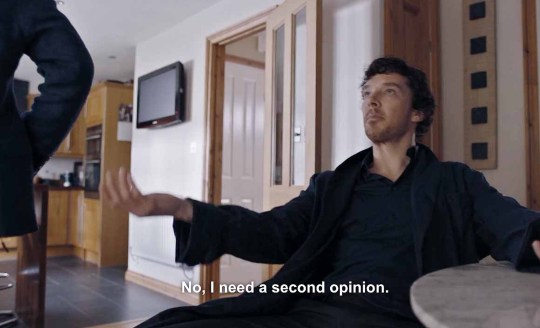
It certainly seems like this blog has been created as a special little treat for the fans, since most of the casual viewers of the show probably don’t even know it exists ‘IRL’. But I think the blog is much more than that; partly because it’s so heavily referenced in the show – with frequent, accurate and exact pictures of it (at least until S4) – and partly because it tells us so much about John’s character. I think John’s blog is significant and important in trying to analyse BBC Sherlock. And maybe the version of John we see in the show will actually get more nuances to it if we look at the blog, which is expressly written by John himself?
More under the cut.
As some of you might know, I’ve written a meta series (X) where I try to explore the idea (originally from @raggedyblue) that the blog describes the ‘real’ events in John’s and Sherlock’s life more accurately than the show, and that what we see in the show up until HLV is Sherlock reminiscing their life together while reading up on the blog. In my view, the show might be Sherlock’s embellished and dramatized version of the events - ironically a bit similar to what Sherlock usually accuses John of doing in both Doyle’s canon and on the blog. But I find the blog’s writing style far more prosaic than the show, and also more prosaic than Watson’s stories in ACD canon; in BBC Sherlock the roles might have been inverted compared to canon.
An example of this would be the scene in TEH (which I talked about in this meta over a year ago) where Mary is (supposedly) reading the following un-published post directly from John’s blog editor:
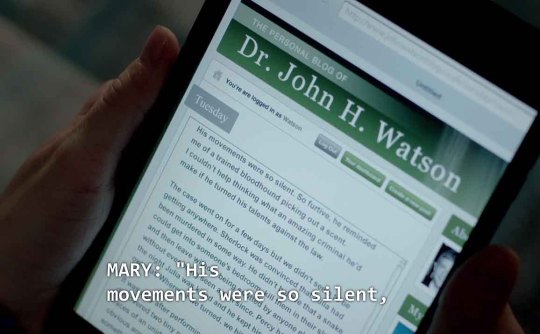
“His movements were so silent. So furtive, he reminded me of a trained bloodhound picking out a scent. I couldn’t help thinking what an amazing criminal he’d make if he turned his talents against the law.”
Something doesn’t seem quite right here, though. While the rest of the post is text from another, already published, post (The Speckled Blond), this first part is taken almost verbatim from ACD’s story The Sign of Four (SIGN). It describes a crime scene where Holmes has just “whipped out his lens and a tape measure and hurried about the room on his knees, measuring, comparing, examining, with his long thin nose only a few inches from the planks and his beady eyes gleaming and deep-set like those of a bird”. I see a big style difference between this and the rest of John’s blog. Since the quote above never appears on the ‘IRL’ blog, I’d rather believe that in BBC Sherlock this is merely wishful thinking from Sherlock that happens inside his Drama Queen Mind Palace. This impressive description is, I think, what he would truly wish that John had written. ;)
I also suspect that the continuing references to different blog posts in S4 are all made up in Sherlock’s mind, since John’s blog ‘IRL’ stopped updating after TSoT, when Sherlock hacked it and took over the storytelling.
Be that as it may, this meta is a reflection upon what John Watson’s famous blog actually might stand for, and what I believe it tells us about his character. In these months of quarantine, I’ve been passing the time by reading through the whole online version of the blog and taking notes of it.
Therapeutic origin
It seems like the initiative for John to start a blog came from Ella Thompson, his therapist. I believe Ella’s initial idea was therapeutic; if it was almost impossible for John to talk to her about his feelings and inner problems in their sessions, she might have found it difficult to help him. Therefore she suggested that he write it all down on his own instead. And if Ella could persuade him to talk about his life on an online blog, she would also be able to read it.
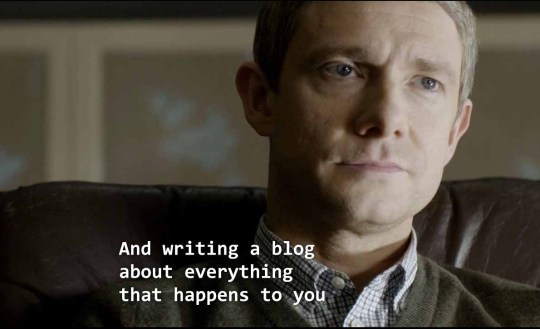
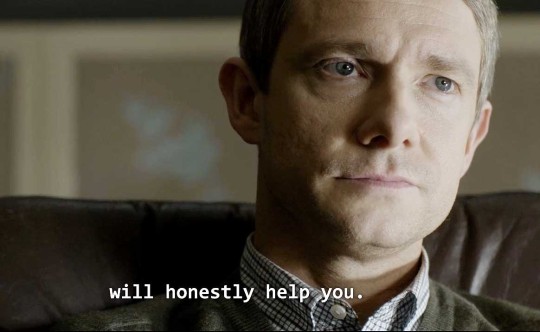
Of course this wouldn’t be the same as if John told her about his inner reflections in confidence, in a real therapy session, but maybe the blog would give him an incentive to talk about his life at all. And you have to start somewhere.
At the end of TST we see Sherlock visit Ella, but when she asks him to “open up completely” he refuses.
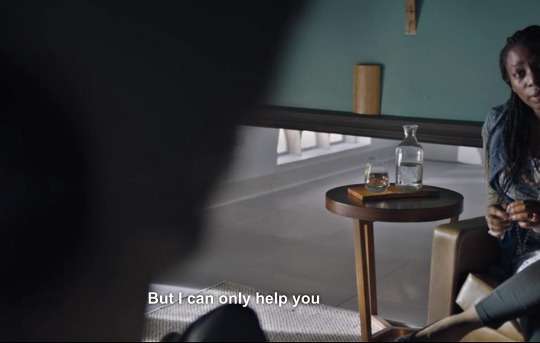
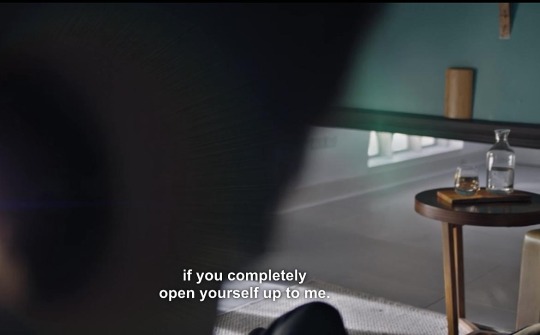
If S4 is happening inside Sherlock’s head (as I believe it is), this might have been Sherlock’s way of trying to psychoanalyse John, to ‘solve John’s case’, by envisioning the therapy situation in his mind palace. A well-known method of Sherlock Holmes is that he tries to put himself in the other person’s place and think about what his own response would have been to the situation. In ACD’s story The Musgrave Ritual (MUSG), Holmes says: “You know my methods in such cases, Watson. I put myself in the man’s place, and, having first gauged his intelligence, I try to imagine how I should myself have proceeded under the same circumstances.”
Which is also evidence that the character of Sherlock Holmes does indeed not lack empathetic capacity. Also in the show, John’s assertion that Sherlock “doesn’t feel things that way” etc. is basically BS in my opinion. The problem is that John refuses to see this.
John’s state of mind before Sherlock
John’s first three blog posts (in the middle of December - January) seem to completely lack motivation.

And this is maybe what one could expect from the deeply depressed John (as he appears in the beginning of the show), isn’t it? No surprises there.
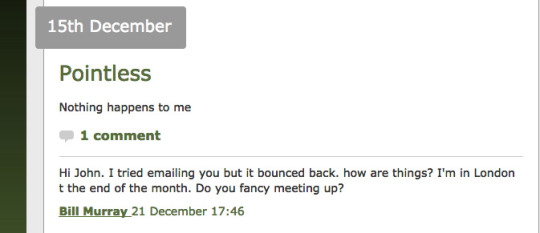
Everything seems meaningless, and John only makes two attempts at blog posts to comply with Ella’s recommendations, but he doesn’t actually write anything in them. After the second attempt his old army friend Bill Murray tries to contact him, but John seems to have cut off his ties with the rest of the world; he doesn’t answer the comment.

At the third attempt over a month later, John seems to want to delete the blog he has started, but lacks the technical knowledge to do so. The fourth attempt is just a snide comment to Ella:
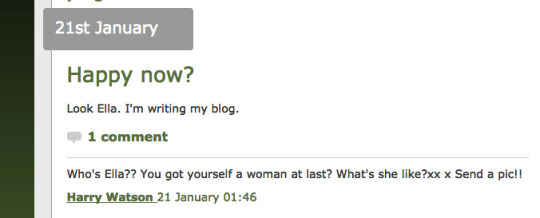
She doesn’t respond, however (not very surprisingly perhaps). Instead, John’s sister Harry discovers the blog and tries out this means of communicating with him. But John ignores her.
But at the fifth attempt at least John has gone out with some friends and describes it – almost bitterly. Sadly, it also seems like John met up with them mainly to avoid his therapy session with Ella.
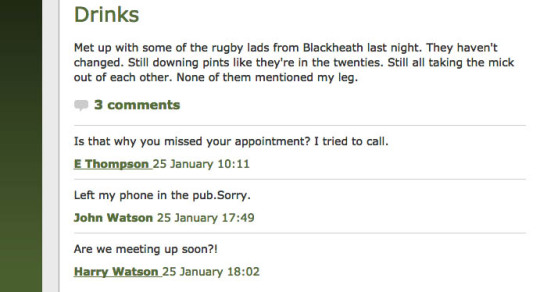
So, the problem is that whatever Ella may have thought that the blog would mean for John’s healing, I think she aimed well but unfortunately missed the target. John Watson does not ‘open up’ himself on the blog. When he finally starts to really write - after he met Sherlock - it’s not actually about him (supposedly); it’s all about Sherlock. Basically, John goes directly from ‘Nothing happens to me‘ to ‘Sherlock happens to me‘.
What the blog tells us about John ‘after Sherlock’
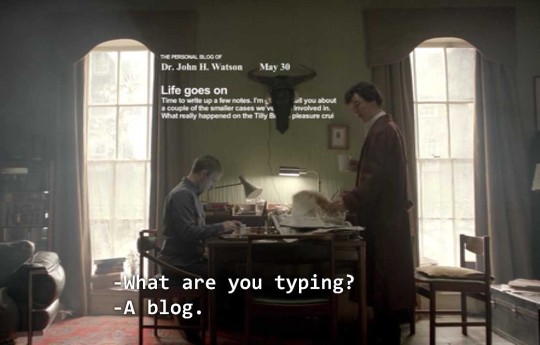
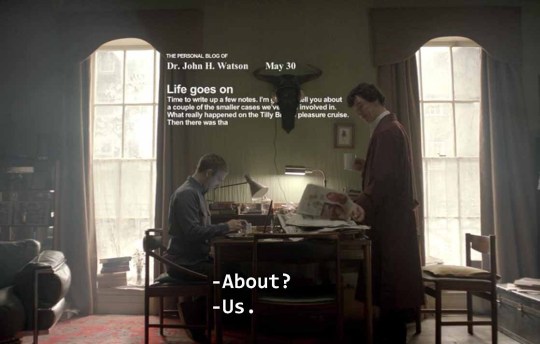
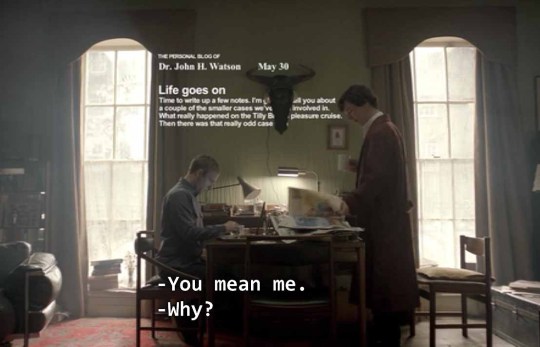
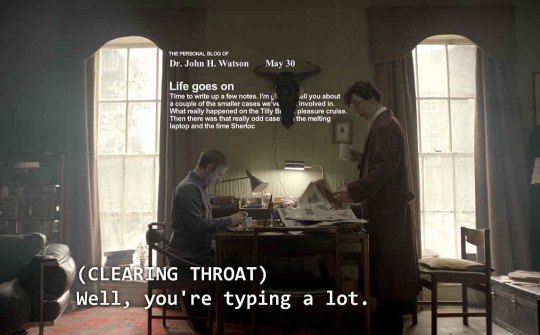
John’s blog may be all about Sherlock, but there isn’t actually that much praise for Sherlock in the blog posts as one might think. My impression is that John applies his (perhaps somewhat overestimated) writing skills to project his own failures and self-loathing on his closest friend. More than anything else, I think the blog is John’s emotional outlet for his frustration over his unsatisfactory relationship with Sherlock and his own inability to improve it. Instead of trying to actually talk to Sherlock, he uses the blog to vent his frustrations over Sherlock, speculating wildly about what he believes Sherlock is thinking and feeling.
The stories and adventures are thrilling and entertaining, yes. But his assessments of Sherlock’s character are really not very uplifting. John doesn’t strike me as an ‘analytic’ person, which in this case means that John’s theories about Sherlock are rather based on his personal emotions than logical conclusions. It’s sometimes even a bit difficult to follow the chain of events in John’s posts, because it’s usually so intertwined with his gossipy and out-of-context comments about Sherlock’s personality.
Unfortunately, Sherlock doesn’t seem to realise this projection, and neither do we see him address the issue of John’s misconceptions about him. I believe Sherlock takes many of John’s jibes and insults at him at face value, which – sadly - only adds on to his own self-loathing. I also think that Sherlock trying to draw conclusions about his mysterious friend through the written blog might be a mistake; it may eventually tell him a lot about John’s problems, but to see these he needs to look behind all the cover-up of blatant criticism of him, Sherlock. Maybe that’s what Sherlock’s trying to do in S4, by setting up scenarios in his mind palace?
Judging by how John comes across on the blog – and in the show – I think Sherlock’s claim “You’re abnormally drawn to dangerous people and places” in HLV is a perfectly sound analysis - on the surface. However, I think one must read between the blog lines in order to see other possible motives for John wanting to hang out with Sherlock. Reading John’s posts textually, he gives a strong impression that he’s there for the adventures; when there is danger in the air, John’s never bored.
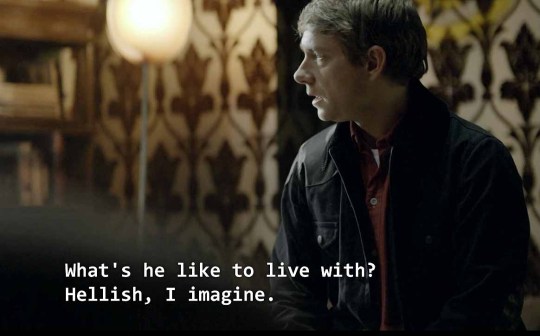
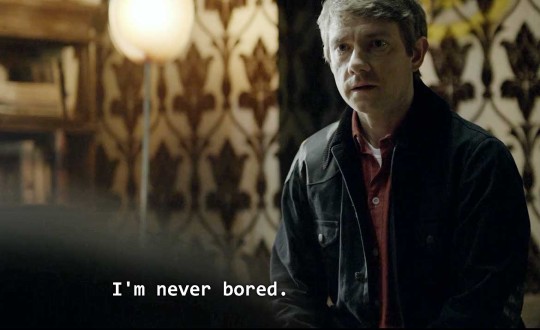
In the comment section Sherlock never mentions John’s evaluation of his character. Instead he repeatedly criticises John’s writing style. I get the impression that this is Sherlock’s subtle way of getting back at John without having to directly address John’s misconceptions about him. As I said above, I think John’s writing style is very different from Watson’s style in canon; far less respect for Sherlock and a far more prosaic and simple language. Canons Watson seems careful not to speculate much, while John does this all the time.
Examples that form a pattern

There’s a good deal of praise of Sherlock in John’s posts, but it has almost exclusively to do with his admiration for Sherlock’s intellectual capacity; he’s repeatedly described as ‘clever’ and after the Fall, John claims that “nobody ever really outwitted Sherlock”. But in fact, I’ve found very few blog posts where John doesn’t also criticise or complain about Sherlock in some way or another. And there are only two posts (out of a total of 45) where John says something positive about Sherlock’s character:
1. After their first meeting he calls Sherlock “strangely likeable” and “charming”.
2. In what John meant to be his last post ever (he believed Sherlock was dead), he calls Sherlock “funny”, “charming” and “everything a good person should be”.
On the other hand, there seems to be nothing in John’s own (supposed) opinions about Sherlock that he regards as too negative or inappropriate to publish online. I very much think this is about self-loathing; he projects his own shortcomings on his “psychopath” friend and flatmate. Like it’s always a relief to have a scapegoat. An additional explanation might be that if John is closeted and in public denial about any romantic feelings for Sherlock, this makes him not want to appear too ‘besotted’ on the blog. ;) Thus, he might believe he needs to compensate the praise with criticism. Problem is, with this contradictory approach the readers might ask: What is John’s actual relationship to Sherlock? Handler? Hostage? Lover? Concerned citizen? It’s hard to claim he’s a ‘real’, professional colleague, since John’s actual profession is a medical doctor. But why would John be friends with a psychopath?
To seriously claim that his best friend is a psychopath seems perfectly OK to John, though – he does it repeatedly, and quotes Donovan’s claim that Sherlock “gets off on it”. At the end of A Study in Pink, John talks about Sherlock and the serial killer as if they were both psychopaths, one undistinguishable from the other:
“The taxi driver drove him to a college of further education so they could both educate each other on - well, on how their minds worked, I guess. It's not something I'll ever really understand and, to be honest, I'm not sure I ever want to understand it. To be that much of a psychopath. To be that above the rest of us.”
John even seems to pretend to prefer ignorance to understanding, only to find one more opportunity to blame Sherlock. Here are some examples of other things John calls Sherlock publicly on the Internet:
Arrogant
Rude
Imperious
Pompous
Madman
Freak
Childish and
Not safe.
He also says on the blog that Sherlock is spectacularly ignorant about some things, like the solar system.
Little Freudian slips
In the post titled The Speckled Blonde
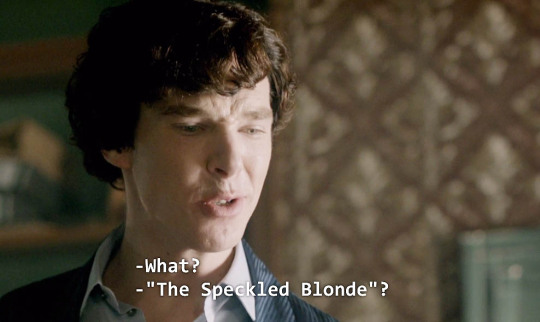
(which is basically a re-count of canon’s The Speckled Band - SPEC) John’s closet angst reaches new heights:

Apparently John finds it important to preventively point out to his readers that he was not sharing a bed with Sherlock. Or, actually, that he even preferred sleeping on the floor before sharing a bed with his flatmate. The thing is, however, that the information that they spent the night in Julias bedroom isn’t at all necessary for the story, since - unlike in ACD Canon - nothing of importance apparently happened during that night. John actually tells us nothing about the night as such. The only ‘feature of interest’ is that Sherlock found a suspect bottle of bubble bath on the victim’s night table, which he took to Barts for analysis (and he was right - the bath had killed Julia by poisoning). Obviously, John could have described this crime scene investigation entirely without mentioning that they had spent the night there. So, if this little morsel of information was so embarrassing for him, why did he even include it? Hmm...
In my biased mind, I can only think of two alternative explanations (not mutually exclusive, though): 1. John had spent so much fantasies and subconscious energy on reliving this night that he just couldn’t keep this info entirely to himself (Freudian slip), or 2. Something actually happened that night - something that had no bearing on the case. After all, John never says that he slept on the floor, only that he was going to sleep on it. ;)
Speaking of bubble bath, I find the fact that Julia died from it slightly suggestive, and even metaphorical, as such. Because there’s also another case on John’s blog describing someone dying in a bath: The Deadly Tealights. The victim suffocated in a bathroom where the candles consumed all the oxygen. John has included this little comment:

Why does John bring up the idea that a person taking a bath with candles would potentially be judged? What has his own bath routines to do with the crime case? Does the victim really need John to find excuses for his private life? Methinks this rather might be John’s closet angst speaking again. Someone has tried to belittle John for liking baths, and apparently John seizes the opportunity to vent about it on the blog. Metaphorically, this tells me that the closet is suffocating for John, and that the ‘chemistry of love’ is involved.
John - The Moral Compass
John is often referred to as the part of the duo who a) is more sociable and b) works like a sort of moral guide to Sherlock. The detective, on the other hand, is shown as a “sociopath” who supposedly doesn’t understand this kind of things. And – to be honest – Sherlock doesn’t actively say much to contradict this perception; sometimes he even appears to agree with it.
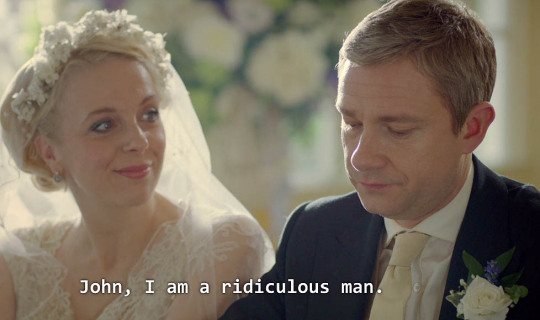
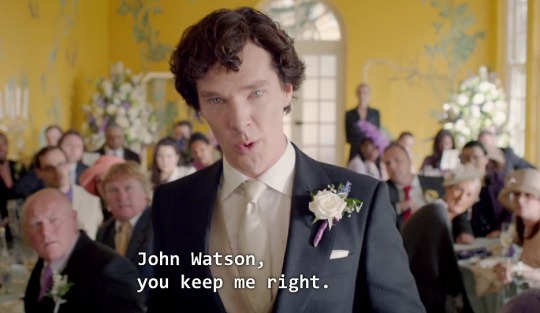
(I think his actions should be a clue to the contrary, though).
According to the blog, John seems to believe he himself is the adult one in this acquaintance, the one who does understand the rules of society. He repeatedly calls Sherlock “childish”. Judging by John’s descriptions in the blog, one might almost think that John had been forced to hang out with Sherlock, trying to do the best of it. But seeing as it’s entirely voluntarily it’s a bit hard to understand, for example, how John can blame Sherlock for “leaving me and Sarah to be kidnapped” in The Blind Banker:

John makes is sound like Sherlock left them to the enemy deliberately, knowing that someone would come after them. But weren’t they at home, supposedly on a date? If John didn’t like it, couldn’t he have left any moment and gone out to continue the date he was supposed to? But no; John counts himself among the innocent persons whom Sherlock “involves in his adventures”:

After reading the whole of John’s blog, all I can say is that this guy is a living, breathing contradiction. How can he be Sherlock’s moral compass if his needle is spinning all the time? :))
In The Great Game John describes himself as just a “pawn” in Sherlock’s and the killer’s great game, equalling himself with the other victims. With his insinuations, he indirectly blames Sherlock for the death of 12 people and goes back to Sally Donovan’s “freak” accusations:

Another interesting bit is this, describing Sherlock’s reaction at the pool, when John for a moment appeared to be behind everything: “I should have been horrified that he'd even doubt me for a second…” Wait – what!? John is capable of telling the whole world the most damning rubbish about his friend, but if Sherlock for any second doubted John, he’d be horrified? This part is also of interest: “But the laser sight simply moved to Sherlock's head and I was forced to let go. For a second, I wondered if Sherlock would have done the same for me but then all I knew for certain was, at that moment, I knew I was going to die.”
Before that, John had just described what could easily be interpreted as Sherlock calmly trying to talk Moriarty out of having John killed, but to John this was just “The two men talked, both clearly pleased to…”. In John’s view, he was the only one who was forced to let go of the killer because of the threat to Sherlock. Honestly, who is it, between the two of them, that most appears to lack empathetic capacity?
Creds and Competence
John appears to be a rather honest, humble and straightforward in the show, quite competent in his medical profession, and in TSoT he is highly praised by Sherlock:

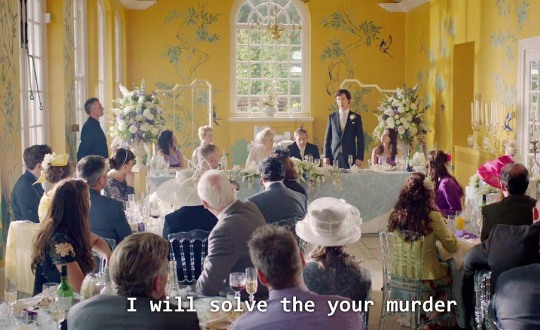
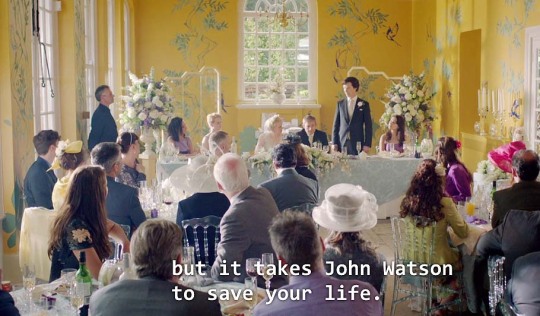
But on the blog John is more ambiguous, and he isn’t always modest. Sometimes he appears to enhance his own role in the crime solving and take credit also for things that are clearly Sherlock’s doing. For example, in The Great Game there’s this:
“Between us, we worked out that while Connie's death had been made to look like the result of a tetanus infection, it had actually been caused by poison - their houseboy, â–“â–“â–“â–“â–“, had overdosed her on Botox!”
But if we’re supposed to believe the show, John actually believed it was a tetanus infection, while Sherlock deduced and later demonstrated poison:
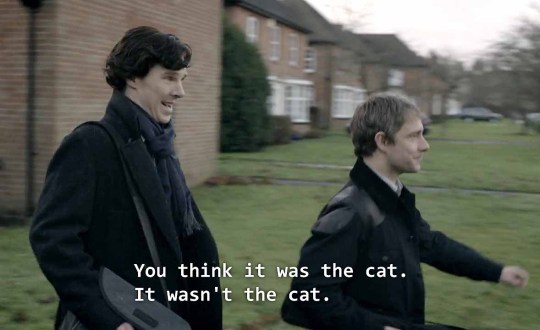
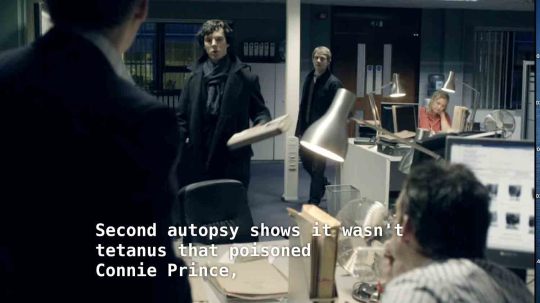
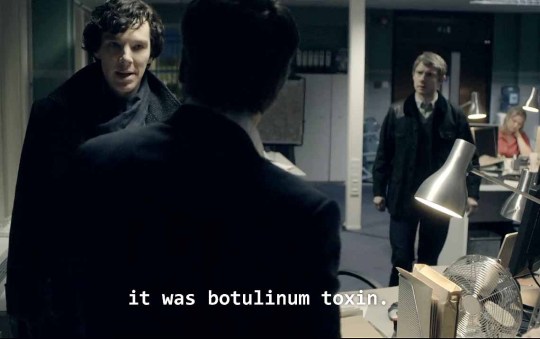
John also expresses a slightly childish vindictiveness in making a lot of fuss about Sherlock’s failures; every single time Sherlock can’t solve a case, John points it out on the blog with glee. It almost gives me the impression that the doctor is suffering from inferiority complex. He even uses “Sherlock Holmes Baffled“ as a title for one of their cases.

This seems to be written in jest, since Sherlock frequently is rude about other people’s lower intellectual capacity, but actually hates ‘not knowing’.
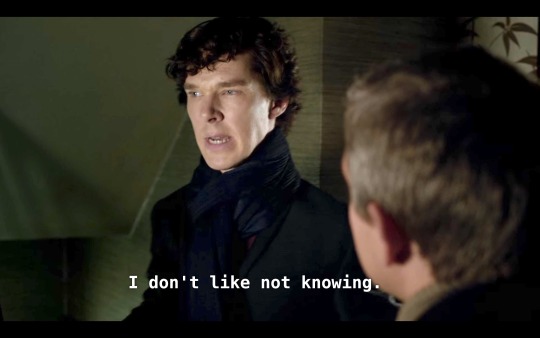
I admit that this may be funny to joke about once, but it gets a little tiresome that John has to point it out every time. Why does John even do this, even as Sherlock has explicitly asked him to not publish the unsolved cases? Which I assume would not be good for their business?
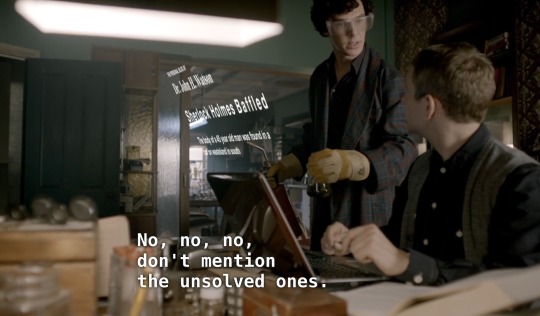
If John truly is Sherlock’s colleague, wouldn’t he also be more interested in helping to solve the cases, rather than talk about the failures? It seems to me that John is struggling so hard against his own feelings for Sherlock that he feels the need to provoke rather than help him.
The Most Inhuman Human
Sherlock’s supposed lack of humanity is a recurring theme for John; he claims that “people” want to know that Sherlock is human, as if anyone - on the blog or in the show - except John had ever questioned this.
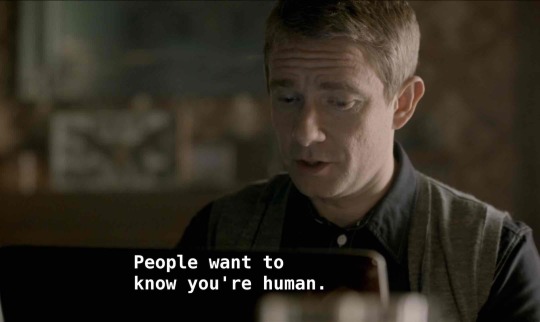
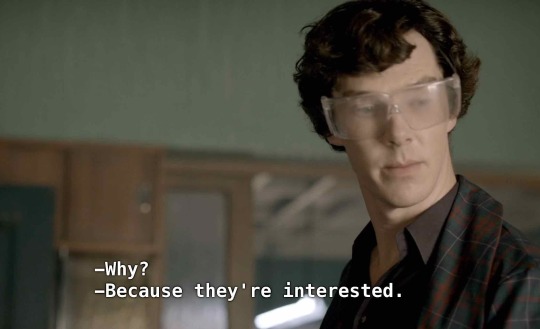
I can’t remember anyone on the blog except John showing an interest in this issue, though. In the post Many Happy Returns he writes this (my bolding):
“Yet the video... it showed the other side to him. He was rude, yeah. Arrogant. Apparently lacking in anything resembling empathy. But I'd forgotten just how funny he could be. He was so charming. So... human. It's bizarre because most people would say he was the most inhuman person they'd ever met. But he wasn't.”
He wasn’t? Wow - great revelation, John! [sarcasm :)]. But who said that, actually? Not even the haters and trolls on John’s blog ever claimed Sherlock was inhuman. It’s one thing that Donovan and Anderson called him a freak and a psychopath, but John is the only character I can think of who has ever implied that Sherlock would not be a human being. Only John calls him a ‘machine’. Which is a load of BS of course; John really doesn’t strike me as a professional doctor when he says this, even less as a friend - always trying to mark the distance.
So what’s Sherlock’s ‘complete lack of empathy’ in that video actually about (mini-episode here)? Was it because he didn’t want to go to a birthday dinner with people? Hardly - John seems to understand this about Sherlock. Or was it maybe because of his comment: “How can John be having a birthday dinner? All his friends hate him!” Well, this probably hurt a bit (even if I rather think he sounds bitter and jealous - he wants John for himself ;) ). On the other hand, Sherlock then backtracks and seems to regret his little outburst:
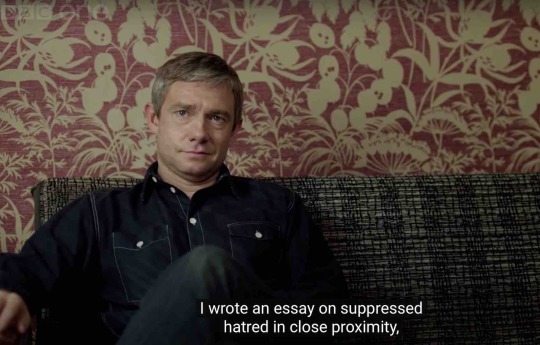
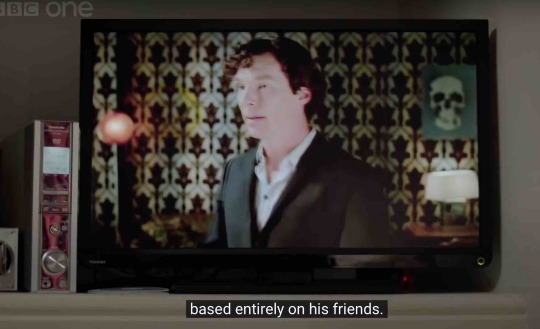
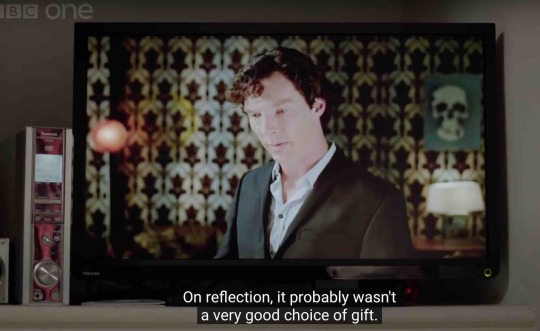
Mary’s role in John’s life
The blog is where Mary Morstan appears to be introduced to John; on John’s first blog post about at least a year after Sherlock’s ‘death’, she suddenly just shows up in the comment section, sending him kisses and inviting him out:

John ignores her, though, and when his sister asks him who Mary is, he doesn’t answer. Mary seems to hang in there, however, and the next time she appears is on the Deadly Tealights post (the one with the dead flatmate in the suffocating closet bathroom). And now she’s called Mary Morstan. Next time is The Inexplicable Matchbox. Both times her only comment is ‘ignore the trolls’. John rather seems to ignore her, though. Finally, he finishes his Many Happy Returns post (which was supposed to be his last) with saying that he has now “found someone” (without naming them) and should concentrate on that.
All this is a little bit weird, though, considering Mary’s comment in TEH, when she is logged in and reading aloud from the editor of John’s blog: “The famous blog, finally!” As if she hadn’t already read all his posts and tried to interact with him on the blog? Hmm.
In the show Mary just seems to come from out of nowhere, suddenly showing up in the graveyard holding hands with John.
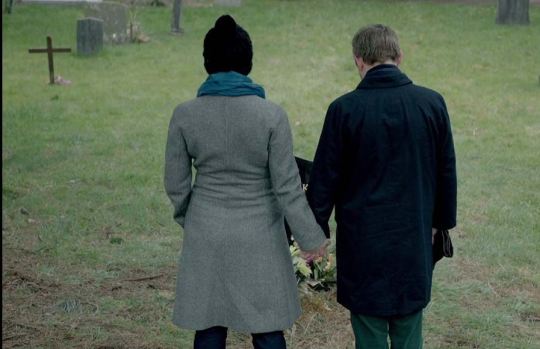
Her anonymity reminds me of Doyle’s treatment of Mary in canon, where she’s only mentioned by name when she’s still a client, before she marries Watson.
On the blog Mary is not mentioned by name until over a year after John met her, in spite of her presence in the comment section long before that. And it’s not until John’s first post after Sherlock’s return - The Empty Hearse - that John says something appreciative of her. Suddenly she is (still without name) "...the best thing that's ever happened to me. Sorry, Sherlock :)”. For the rest of the blog posts, John’s (very scarce) answers to Mary’s comments are never flirty or appreciative in the least. Mary’s own last comment, on the very last post - this time written by Sherlock who hacked the blog after John’s and Mary’s wedding - is this: “SHERLOCK! SHUT UP NOW!”
None of this gives me the impression that John has fallen in love with Mary. The silence with which he treats Mary on the blog rather makes me think of her as someone basically not very important; a sort of substitute in a desperate attempt to fill an emptiness in his life. And I think it might be significant that as soon as John recognises the existence of Mary in his life, he seems to use her as a sort of buffer towards Sherlock. A façade. First it’s the gleeful “Sorry Sherlock :)” comment above. Vindictive, it appears. And then, in the post Happily Ever After, John insists that his and Mary’s impending (heterosexual) marriage must clearly be the reason why Sherlock chose to help a gay couple getting together, one of them leaving an abusive marriage which was basically a façade. This whole ‘conclusion’ is so stupid that I’m rendered speechless.
Summary
To summarise - for those of you with enough patience to have followed all my ramblings in this marathon meta - I think the picture of John’s character that we can discern from reading up on the whole of his blog possibly tells us even more about him than the show. If the show reflects Sherlock’s mind, albeit almost entirely focused on his own perception of John Watson, this blog might actually give more insight into how John’s own mind works. I think it shows us someone who is struggling desperately with his own feelings. Someone who is trying to mark a distance that he believes is healthy for him, but that he actually doesn’t want, towards the object of his affection, by criticising them. The full-fledged, living, breathing contradiction that is John Watson comes to its full right by the blog. We could almost say he’s ‘human’ :). Kudos to Joe Lidster and the other showmakers for providing us with this gem.
Tagging some people who might be interested: @raggedyblue @ebaeschnbliah @gosherlocked @sagestreet @sarahthecoat @tjlcisthenewsexy @elldotsee @88thparallel @sherlock-overflow-error @yeah-oh-shit
220 notes
·
View notes
Text
Hello TWEWY fandom, it's meta time.
TWEWY is filled to the brim with symbolism and hidden meanings, as we all know. Even the partners and their colors when they sync with Neku; I realized, have some depth, and I'm going to articulate my thoughts on it. This is going to be long, so get cozy.
Shiki
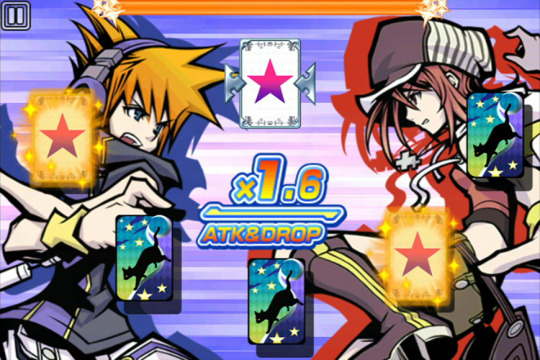
Let's start with the first partner we get. Her theme's red, and Neku's is blue. Before we even delve into this analysis, let's unpack the general symbolism of the colors themselves, because that is important as well.
Red: passion, love, anger, energy, courage
Blue: trust, loyalty, wisdom, intelligence, stability
These two colors are essentially on the opposing sides of the color wheel as well; the only shade darker than blue is purple (which is Neku's theme of his attire but that's not important rn stay with me fellas)
Red & blue are portrayed as opposites in a plethora of media and this is no exception: Shiki is the extroversion to Neku's introversion, the pathos to his logos, bubbly and chipper vs his stoic and reserved demeanor. Neku is outwardly hateful (towards other people and his circumstances), and Shiki is inwardly hateful (she hates herself to the point she doesn't think there's anything special about her)
As expected, they clash vehemently at first. Neku is extremely irritated by Shiki's energy and she is frustrated with how aloof and mean he can be. But as they get to know each other, they become like yin and yang; and Shiki's kinder qualities begin to rub off on Neku which he exhibits in the following weeks. Red is often symbolic of love; and Shiki shows a lot of it: she's very friendly and amiable, sympathizing with total strangers and getting along with almost everyone; but she's pretty feisty too- she gets visibly upset when Neku ignores her and makes himself difficult and she's not afraid to call him out (and she DOES, quite a few times). However, she is still overall kind to him, even when he's prickly; trying her best to be patient with him and her gentleness eventually wins him over.. eventually.
When confronted with an issue, Shiki seems to lean towards the emotional aspects of the matter, such as when Ai and Mina were at odds, she hesitated to bring the truth to light because she didn't want to jeopardize their friendship and emotional wellbeing; in contrast to Neku who wanted the truth to be brought to light as soon as possible because he felt that lying was wrong and it needed to be addressed sooner, rather than later, or things would just get worse. Or when 777 couldn't find his tech, Shiki listened to him vent out of sympathy while Neku agreed to help because of the logical results it'd bring-
Shiki is also very outwardly emotional: she's very chirpy but she also isn't afraid to openly express her sorrow, anger, or fear, and sometimes she gets overcome by her emotions. But for the most part, she exhibits high emotional intelligence and understanding of other's feelings; and she's essentially the group's moral support: she's one of the most verbal about being sure that they'll make it back and that they all need to work together. Shiki is also extremely passionate; about other people, about the things she creates, it spills into virtually every aspect of her life.
The sad thing though, is that Shiki seems to love everybody but herself, and we see tiny glimpses of this in her small moments of passiveness (such as telling Neku he doesn't have to shout when he snaps at her) On the flip side, Neku's blunt honesty gives Shiki the inner strength to not only face her self-hatred; but overcome it. And that brings me to Shiki's other color: green. You can see it in her stickers + it's her nickname in Another Day.
Green: nature, rebirth, growth, harmony, healing
I believe that this choice is two-fold: green also symbolizes envy and jealousy and this is something that Shiki's character battles with. She wants to be like Eri- beautiful, smart, charismatic; to the point she even tells Neku that she emulated Eri's personality at first because she was so excited to be in her body. But she then realized that she wasn't Eri, and would never be; nor did she ever want to be. What Shiki truly wanted was to love herself: and that's what her character arc encapsulates; a journey of self-acceptance and self-love.
When we finally get to see real game Shiki, she's wearing green because she's a new person, hence the themes of rebirth and harmony: she's confident and happy in who she is; and so the green changes from the negative connotations of jealousy and envy to the positives of steadiness and self-harmony. There's also healing, for both her and Neku: she helped him to open up emotionally and become gentler, and he helped her accept herself. We don't get to see her face because it doesn't really matter: as Neku himself said, "You'll always be Shiki." It's her character that is important, not her appearance. Green is also red's complementary color, and we see that rather than doing a complete 180 in personality, Shiki just gets a little milder. She's not quite as bubbly, but a lot of her passion is still there, it's just gentler.
In short, Shiki is Neku's opposite. They're like night and day: completely different, but inseparable.
Let's talk about Neku a while now, shall we? His color choice seems contradictory given his personality when we meet him: he is extremely distrusting, volatile and aloof. The thing is though, Neku's arc is also about growth and while he does not exhibit any of the traits of his color scheme at first; during the entirety of the game, he regains himself. Neku's character is about relearning how to trust people and not being afraid to be open and accept different points of view and values- and that diversity is good and healthy! During his first week with Shiki, we get very small glimpses of how emotional Neku actually is, particularly through inner monologue.
When Rhyme is erased, he's distraught (his thoughts tell us he feels awful) but he masks it with blunt logic ("Because we couldn't. That's how it was meant to be"), perhaps to avoid showing vulnerability, even declaring teaming up is a dumb idea- because people get hurt and there are situations where there's nothing you can do about it. Neku's rant when Shiki declares that Beat and Rhyme were their friends takes us right into his psyche:
"Who needs friends?! They just laugh and talk like idiots and pretend to agree with you- so you end up caring about them….exposing yourself...getting HURT..Screw it! We're better off without them! You want other people getting in your way? Dragging you down? I don't!"
And suddenly, Neku's prickliness makes sense- he views attachment as painful and vulnerability as a risk, and so he vehemently avoids them. He's mean because he's hurting and he's sad: and how fitting, as one of the negative connotations for blue is sorrow and grief. Remember how I said Neku didn't exhibit any traits of blue? Well, that was specifically for the positive ones.
Negative symbolism of blue: coldness, aloofness, lack of emotion, unfriendliness, sorrow
And that's Neku to a tee: at first, anyway. While his behavior is not justifiable, it is understandable.
When Shiki snaps at him and tells him that he's inhuman Neku doesn't show any outward response during the actual conflict, but the next day when she apologizes his sprite changes to the "sad turtle" and we get to see his thoughts again:
That I was no better than a Reaper…
Rhyme…
……………
Well...right now…
Neku proceeds to tell Shiki that they need to focus on the mission, and she agrees. While he isn't being especially friendly with her, it's leaps and bounds from his initial open hostility: he's more willing to work with Shiki towards a common goal and one could argue this is when his paradigm shift begins- her comment rattled him a lot, and Neku makes baby steps to change. The daily mission (which involves helping two friends address a misunderstanding) gives us more development for him, too. At this point, he still doesn't think conflicting views and values are a good thing and that relationships only hold him back; and he voices to Shiki that he doesn't see the point of friendships built on falsehoods (which is an excellent point and one that she actually agrees with) and we get to see one of Neku's good qualities: he values truth and honesty a lot.
She asks him if he truly thinks that people are better off without friends, and when he doesn't answer; Shiki talks about how meeting Eri made her want to be her best self (which is how ALL healthy relationships should be, whether platonic or romantic). She mourns Rhyme again, venting that it isn't fair she'll never know what dreams are like and this time, Neku doesn't deflect. He sympathizes, and for the first time since entering the game, allows himself to be emotionally vulnerable:
"I know. I…. I'm sad too. We'll just have to live a little extra. For her sake."
From this point onward, Neku begins to grow positively, slowly but surely. He's not friends with Shiki yet, but he feels safe enough in her company to not only express sorrow but caring enough to encourage her to keep pressing forward; for Rhyme's sake. The next day Shiki is quiet and sad due to being confronted on her self-hatred, and Neku doesn't know how to deal with her lack of cheeriness. But instead of being annoyed with her like before, he's visibly concerned and wondering what's wrong; and he tries to engage with her as much as possible: asking for her viewpoint on the daily mission and what they should do, etc. When he learns the truth about Shiki's identity, Neku just listens patiently and afterwards, his monologue is much more positive and understanding:
All this time..she's been as confused as me.
He now realizes that she's just as scared and upset as he is and he empathizes with that, going even further to say that "I like you the way you are" when Shiki expresses fear in being brought back due to her underlying jealousy: he appreciates her, every aspect of her; not because she's perfect, but just for who she is. Later on when Shiki hesitates to scan Eri and runs away Neku gives her the push to do so: as said earlier, he values the truth, and he knows that Shiki needs to face it if she's going to improve as a person- and we see him beginning to exhibit his wisdom. He's not really gentle, but his honesty is needed. When Shiki begins comparing herself to Eri and self-deprecating, he intervenes, in his own way:
"Oh, would you cut the crap? Who ARE you? You're you. You're not Eri. You'll never be Eri. You'll only ever be you."
Neku reiterates what Shiki told him earlier, about never wanting to be Eri, but he goes a step further. She only went as far as to say she wanted to love herself, but that she never could; while Neku asserts to her that being herself is absolute and unchangeable. Shiki mildly protests this though, saying that Eri is "so much better". To her, while she does value her identity the most, Eri's identity makes her feel inferior. She wants to be her own self, but Eri, in her eyes, is perfect, something that she cannot achieve. And that is why Neku's reply is so important.
"Forget her! You need to live your own life. If she can do it, so can you. All that matters is that you try. You're lucky you're jealous. It gives you something to shoot for. So..shoot."
Up to this point, Shiki has measured the worth of her identity based upon comparison to others, and Neku understands that and tells her upfront that she needs to stop trying to be somebody that she isn't and be confident in her own self, and just do her best- and that'll be enough. He also encourages her to use her jealousy in a productive way, to find her niche; her drive. This gives Shiki the courage to go back and listen to what Eri has to say, and in doing this she hears her friend praise her positive traits, ones that Shiki herself most likely never even realized: her empathy and love for people, her eye for detail, her skill in creating things, her passion and motivation-
ALL things, that according to Eri, "I don't have." And Shiki finally understands that Eri saw her as her equal and that who she is, is valued. Of course, a few positive reinforcements is not enough to do a 180 from most likely years of self-hatred, and so she asks Neku again if she's okay the way she is; and his reply shows yet more growth:
"Hey, Shibuya's got room for all types."
This is a STARK contrast to his dialogue when we first meet him- "All the world needs is me," "You have your values, and I have mine," etc. Neku valued his identity, but he took it to the extreme in that he ONLY valued his identity, values, and morals. After meeting Shiki though, his viewpoint changes a bit and at this point Neku now appreciates diversity- he's still not at the point that he feels he can understand other people, but he at least doesn't see conflict of morals as a bad thing anymore. And in turn, this gives Shiki the inner strength to want to go back to the RG and start afresh. He gives her one last push to go back when she hesitates since she was the only one granted a second chance, with the promise to see her again; and in just a week, Shiki goes from being the biggest pain in Neku's side to his biggest motivation for surviving the second game and one of his best friends.
Joshua
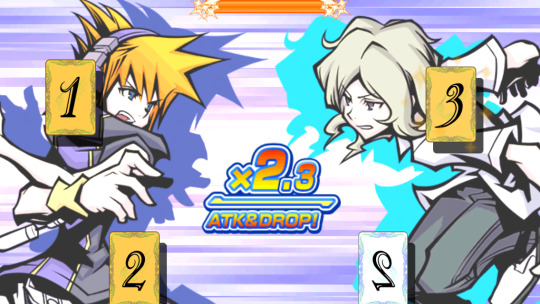
Another week, another partner.
What's interesting about Joshua is that he is also blue, just a lighter shade. While Shiki is Neku's opposite, Joshua is more akin to his shadow- a mirror, of sorts.
Light Blue: peace, serenity, ethereal, spiritual, infinity
Josh and Neku are extremely similar, but their personalities still converge at enough points that they're starkly different: their tempers especially are a separating point as Neku is much snappier than Joshua (especially if provoked), and despite Josh being represented by a lighter color, in a lot of ways, he symbolizes his partner's negative traits in even more extreme ways in a subversion to expectations; a "darker" version of him, in a sense.
When they first meet, these two also clash, but for entirely different reasons. Joshua's attitude, as well as his dodginess, pisses Neku off immensely. While his first week with Shiki is about relearning how to build trust, his second week is a test of said trust by giving him a partner very similar to his former self: distant, aloof, uncaring. It gets especially tricky when Neku scans Joshua and sees himself dead, and he begins to distance himself again; deciding that there is no way that he can trust him- and not only that, but that it'd be ridiculous to do so. Neku senses something is off: he doesn't know what it is, but it unsettles him enough that he is steadfast in his decision to keep Josh at arm's length.
...Until he and Josh visit Mr. Hanekoma, and upon learning that his teammate and Mr. H are acquainted, Neku decides that perhaps Joshua isn't as bad as he initially thought: but he's still pretty hesitant; and understandably so. Mr. H gives him some backstory of his partner, and his motives start to come to light - turns out, Joshua has been able to see the game while living, and that alienated him from other people since Hanekoma was the only one he could confide in. Just like with Neku, this doesn't justify his behavior, but it does make it understandable: Josh pushes away people by playfully antagonizing them and making himself difficult, and Neku pushes them away through hostility.
When he and Josh visit Udagawa, they connect on both not doing well in groups and Joshua comments that they're more alike than he thought, which leads into a conversation about people not being able to understand each other as long as they have their own worlds and Neku begins to backslide a little:
"Right? They're them, and I'm me. Talking to them gets me nothing."
He goes on to say he respects CAT and their philosophy about doing your own thing and how he needs to just enjoy his life and forget about others, and Josh agrees. While Shiki is Neku's friend, she is the exception, not the norm, and Neku still doesn't trust most people. However, when Josh expresses not needing other people's values, Neku's reply is interesting. He agrees outwardly, but it's hesitant, as if he's unsure of himself.
"Yeah..."
His inner thoughts show us that once again, he is changing.
But...I don't feel that way anymore. Since coming to the UG, reading people's minds- Shibuya's full of people with just as many viewpoints. Mr. H said the world ends with me. To expand my world, I have to learn to look farther- not write off other people's values as inferior.
….Maybe I had it backwards. Maybe I need to open up to really enjoy-
Josh calls him and snaps him out of his thoughts so we don't know what he was going to think next, but Neku has definitely experienced a massive paradigm shift in his way of thinking: he's inwardly questioning himself and acknowledging his wrongs and showing willingness to trust again and is showing a lot more empathy to other people. However, this resolve begins to crack when more holes in his memory get filled. Neku is angry and confused, but most of all, he's hurt and we see it in his reaction when Josh asks if he's okay; because he distances himself again. This situation causes him grow distant once more and he also gets more openly prickly since his trust is shaky. Josh relating to him that he feels he belongs in the UG doesn't help matters, either.
However, a later conversation has him moving forwards again. While acknowledging that people are not meant to see eye to eye, he thinks to himself that perhaps it is better that way. People don't think alike, but they can at least try to understand each other; and he then gets the resolve to actually counter Joshua's argument of solely reading people's thoughts and not talking to them.
"But why? Where's the enjoyment in that? I'd rather broaden my world my own way."
And again, we get a small paradigm shift of Neku feeling comfortable enough to express the positive changes that he has slowly been experiencing: blue symbolizes stability, and by this point in the story he is obtaining more and more of it: in his values, in his emotional expression, in how he deals with people, etc. He gets thrown for an immense loop learning that Joshua is alive though, and Neku finally snaps when his teammate brushes it off claiming they're "just like any other pair"-
He's utterly disgusted by Joshua treating the Game as an adrenaline rush- even when Neku first got into the Reaper's Game, he never enjoyed it, even if he initially was only looking out for himself at first; and the idea of getting excitement from toying with death is foreign to him. It only gets worse when Neku accuses Josh that HE killed him, and simply is taunted in return. From that point onward, he becomes openly hostile and snappy again, throwing the idea of trusting his teammate to the wind and tells him upfront that he's only going to tolerate him to survive; leaning back on his negative qualities (because growth is a process and there will be moments of wavering and backwards steps, and that's normal!)
Later on he also shows open distress when a Reaper is attacked and they are unable to save him; declaring they "left him to die." Even though it wasn't any fault of their own, Neku self-blames just like Shiki did in the first week- thinking that he could've done something, maybe if he had gotten there sooner, or defeated the Noise faster. While not 100%, Neku is comfortable enough to openly express sorrow, and Joshua underhandedly sympathizes and takes the blame off him ("We did what we had to do Neku.") He also protects Sota from Noise later down the line even though his partner is already erased and he's going to die anyway and again expresses sadness ("If only we'd gotten here earlier") and even indignation after the older man dies, screaming in anger about all the people who have been erased ("These are people, not toys!!"). When Josh questions him about the interest in others, he then explains that he's gotten to know folks better and that "it's different now".
"They're not just strangers. I can't shut them out like that."
This is really important because in this, Neku is essentially declaring he cannot go back to who he used to be; nor does he WANT to. He refuses to, and he is making a conscious effort to be open to other people even if he doesn't understand them. Neku goes on to assert that one needs to reach out to others as well in counter to Josh asserting that he won't ever be able to understand others and this time, Joshua responds positively. Through Neku's steadfastness and refusal to waver on his viewpoints once he truly feels solid in them, and his courage to express them and not back down; he influences Joshua into thinking that perhaps people truly do need each other and can understand each other, even if it isn't easy to do so. In showing sympathy towards his enemies, he also proves again and again that people can change too, for the better; and his wisdom begins to shine once more. (And it is this change that ultimately leads Joshua to decide to save Shibuya) Unfortunately, Neku is thrown for yet another loop upon getting more of his memory back and thinking that Sho killed him, and Josh sacrificing himself is absolutely world-rocking.
He blames himself again, angry at himself for not opening up; and it is with this mindset that he is thrown into the Reaper's Game for the final time. His trust is in shambles, and the third week is Neku's personal test to see if he is willing to reach out despite being recently wounded by his partner.
Speaking of, Joshua doesn't really have an arc compared to the rest of the cast: rather, he serves as the catalyst to their growth instead. His character is interesting because from beginning to end, he expresses essentially none of the positive attributes of the color he is represented by; he only appears to at first glance. While Josh does change his mind about destroying UG Shibuya and is convinced that people can change for the better, whether he himself changes for the better is up for debate. Orange is the second color associated with him (it's the shade of his cell phone and his stickers), but just like with light blue, he expresses none of its positive traits.
Orange: enthusiasm, happiness, creativity, determination, encouragement
Negative symbolism of orange includes insensitivity, pessimism, and being unsociable, all aspects of Joshua's character. He doesn't think that people can change; and that it is impossible to understand them (he even goes as far to express "I'd rather just get rid of them" in a dark contrast to Neku, who is content to merely ignore people). Josh doesn't like groups of people either, and he exhibits insensitivity many times throughout the second week, merely behaving charismatic in order to interact with others. He doesn't really grow outwardly, but that's not the point of his character; he's Neku's test to see if he's truly changed or not.
Joshua is Neku's shadow, he's in the same vein. Rather than night and day, they are as dusk and midnight.
Beat

Beat is interesting because his color was actually switched for Final Remix: in the original DS version Beat is green, and in the Switch version he is yellow. I'm going to dive into both because I feel they're equally important. I already covered green for Shiki, but green has yet another meaning which describes Beat to a tee- safety. While Shiki is the moral support and mediator, he is the protector: he's extremely sacrificing for his sister and the people he cares about to the point of putting himself in physical danger to keep them safe (such as jumping in front of a car to save Rhyme, or jumping in front of Neku to protect him from a brainwashed Shiki). That much stays constant throughout the game. Healing also applies to him, as he helps Neku to open up and feel safe being emotional again by not being ashamed of being emotional himself: Beat openly cries over Rhyme and Neku mourns with him, and they help each other heal by learning to rely on one another. Not just as partners, but as friends.
Yellow: joy, warmth, positivity, friendship
From the get go, Beat is a huge bundle of energy and he's extremely kind; although he gets rather volatile if he feels slighted. But like with Shiki, he's overall a very sweet person and openly emotional: he gets angry in a heartbeat, laughs heartily when he's happy, and cries freely when he's sad- and his tears are never portrayed in a negative manner either; they're just a normal reaction to a sad situation and this normalization of sorrow leads to Neku getting comfortable again in being vulnerable- one could argue he's the most emotional in Week 3. Yellow is the complementary color to purple, which is also the main shade of Neku's design. Rather than an opposite like Shiki, or a shadow like Joshua, Beat is Neku's foil. He's a lot kinder and he's got a big heart but he is also extremely impulsive and acts w/o thinking. In contrast, Neku thinks things through logically, but he's a little lacking emotionally; and so they balance each other out. He's also highly attune to when Neku starts withdrawing into himself and gently snaps him out of it constantly; showing once again his sensitivity to emotion. (He consistently asks Neku if he's okay when he gets lost in thought; which Neku does a lot, especially if he's upset. Beat keeps him grounded.)
Beat's arc is finding value in himself again + doing his best; not for other people, but for himself and finding his drive. When mourning Rhyme, he vents that "she thought I was worth dying for" and that she had much more to live for, and he doesn't understand why she'd sacrifice for him. (And he blames himself for her death, as well) While Beat is protective out of the kindness of his heart, it also comes from a lack of self-worth: he places other people above himself, to a fault. Neku sympathizes with his grief but then goes a step farther to encourage him to not be regretful. In another contrast to Shiki, rather than another's identity making him feel inferior to the point of emulating them and overshooting, Beat jumps to the other side of the ditch and loses his passion altogether.
Rhyme refused to give up on him, but eventually Beat began to resent her pity and he began to push her away as well. After they both died and came to the Game though, Rhyme's declaration that she had nothing to live for startled him into realizing that she meant a lot more to him than he thought and more than anything else; he wanted to be there for her as she was for him. After beating himself up, Neku comforts Beat in his own way, telling him that he needs to focus on the now and not let his sorrow overcome him, in essence; but also to go the distance just for himself, not for anyone else.
And Beat gets his fire all over again, eventually declaring that Neku isn't his partner anymore- he's a friend, and one that he cares about a lot.
Through his partners, Neku finds himself, they all strengthen different aspects of him. He learns to trust, to be open, to find value in friendship again and him taking off his headphones is the ultimate metaphor of him letting the world back in.
Shiki, his opposite.
Joshua, his shadow.
Beat, his foil.
They all shaped his world, and showed Neku just how wonderful it really is.
And that is beautiful.
#twewy#neku sakuraba#shiki misaki#joshua kiryu#beat#daisukenojo bito#the world ends with you#meta#I have a lot of feelings for this game. It's a masterpiece.
17 notes
·
View notes
Text
Why You Should Try to Comment on Fan and Original Works, Not Just Like/Kudos/Bookmark
So I saw a post sorta talking about this, but it was tumblr-focused and talked more about how to reblog/was more of a venting topic. I would like this to be a topic that can go for any site that people post fan and original works on: fanfiction.net, ao3, tumblr, lifejournal, wattpad, patreon, instagram, etc. I also want it to be clear this is for all forms of works, including fan/fic, fan/art, even aesthetics, meta, etc. Honestly, this also goes towards all the kind souls creating Instead of creators lamenting, I want us to explain why comments helps us out so much more than likes/kudos/wordless reblogs/etc.
Hence: Why You Should Try to Comment on Fanworks, Not Just Like/Kudos/Bookmark
Because it shows appreciation and that you actually took the time to look at/read our art.
Likes and kudos are super easy to give out. We get that. But you know what’s not easy? The time, effort, and dedication we took creating something. Liking/kudoing something is great! But it also gets really tiring for us. It’s like a round of applause after giving a speech. It’s nice, it helps break the tension... but then the host asks the audience if they have any questions or comments and it’s just radio silence. Then it gets embarrassing and stressful, and you feel like you must have done something wrong because a good speech should provoke reactions and interest.
If you just like/kudos our work, it could just mean you saw it. You showed up in the audience and clapped when everyone else did. But it doesn’t mean you were present - that you listened, that you really took in or cared about our work. Maybe you liked it because you wanted to read it later. Maybe you liked it because you recognized the name and just liked that we were posting.
Liking/kudoing is nice. It really is. But it’s just not as fulfilling as actually interacting with us.
Because it lets us know that people care and encourages us to keep posting, keep trying, keep working at it.
I’m positive that you all have worked at something in your life and consistently don’t or didn’t get gratitude for it. It wears on you, doesn’t it? Even a once enjoyable task that you were passionate about becomes a grating chore. Nobody seems to care or recognize your effort. Doing the thing becomes annoying and frustrating, like what’s the point? It’s human to just need a little recognition. Just for someone to notice and say thanks every once in a while!
Lack of interaction with people taking in our creations can absolutely wear us down. It can mean our muse disappears and we hit writers block. It can make sharing our work more stressful than it is fun. It can burn out creators from creating that content that you love when nobody interacts with us. It’s happened to every single one of us at some point that we at least take a break, if not leave creating for fandom forever. But if people are saying thank you and are letting us know they do appreciate our work, it encourages motivation so much more and keep us creating and growing.
You’ll see stories of this on other posts, but fanfic writers have been encouraged to suddenly take up and complete years old fics due to someone coming along and reviewing. Really, comments can mean so much to us. If you’re not a creator, you may not really understand this, but I have a folder where I’ve saved screenies of kind comments and reviews for bad days when I need the uplift. Reviews and comments can mean absolutely everything to us.
Because it’s kind. A common courtesy to thank someone for their gift, if at all possible.
In most these cases, you are getting to consume our work for free. The very least you can do is let us know that you saw and appreciated our work. We’re like musicians who play on the street corner. We like to please and entertain you. But we cannot sustain ourselves always doing it just for free. It feels good when people who enjoy our work say something to let us know, do something to show their appreciation.
If a friend surprises you with a gift, do you take the gift and run away from them? Or do you say thank you so much for thinking of me, this means a lot? When someone does something nice for you, when they think of you, it’s kind to tell them you appreciate the sentiment.
Our creations are a gift. We do not share them because we have to or because our work is only valid when consumed or any such nonsense like that. We share them because it made us happy to create them. We want to share that joy with others! We want to entertain you and put you through a journey. We want you to experience that content that you love. That distracts you from your life for a little while and just lets you experience something new altogether.
What we create is a gift. Please treat it as such.
Because it can make you feel happy and satisfied, too.
Whether a creator responds or not, it can give you satisfaction to know that you were able to, in some way, return the favor to the creator for the gift they gave you. It is always nice to be appreciated. Obviously, creator and fan cannot endlessly interact going “thanks”, “you’re welcome, thank you”, “of course”, etc. But a simple comment can make a creator’s night, and you should feel good about fostering that.
~
Okay, so now you know why creators really, really try to encourage fans to interact with us with comments, not just likes/kudos/etc. But I know from my fandom forum days that a lot of people don’t review because they are intimidated.
We’re the creators. We do not expect each and every fan to write a novel in response to our fic, art, post, etc. You don’t need to do anything more than tell us “thanks” to life our spirits and make your gratitude known! I’m not exaggerating. The different between someone tagging a post “thanks” and everyone either just liking the post or reblogging it with absolutely no comment is world’s apart.
That’s it. That’s literally it. If you don’t know what else to say, if you don’t feel you can particularly communicate your feelings... just say thanks!!! It’s such a nice thing to hear.
If you loved it, just say “i love this!” That’s all that’s needed! You don’t need to make this complicated! Share the positive feelings you felt or simply thank us for creating/sharing. That’s enough!!!
And so few people do this. If even just a fourth of fans started doing this, we’d feel 100x happier sharing our work!
If you want to expand more, here’s some things you can keep in mind to add to your review:
What do you like about the creation? A specific line, a character’s characterization, the colors, the unique style, a specific event, a headcanon, a a part of some analysis you never thought of before?
Do you have any questions? Was there a plot hole or something you didn’t understand? Maybe you learned something or want to know where an artist learned some technique? Are you wondering why character A made some choice rather than what you would have picked?
Do you want to see more? What in particular do you want to see more of? Did you like the plotline with a specific character and want to see how that plays out or you would love to see x character in an artist’s style or maybe an analysis didn’t take a whole episode into account that you think would be interesting to compare?
What feelings did the creation invoke in you? Were you struck with a sense of awe or overwhelming happiness? Were you excited to see someone doing something you’ve always wanted to see or excited at a new idea you never thought of? Did it strike a personal chord with you or bring about a feeling of nostalgia? Were you scared or sad or anxious for intense scenes?
Is there room for growth? Can you help encourage this growth by reminding them how far they’ve come already and how good they’re doing and how you can’t wait to see where they go next?
But we absolutely do not expect this from everyone, though it always, always tickles us and makes our week when anyone does post a longer review. Adding a simple ‘thanks’ in addition to or instead of liking/kudoing/reblogging without comment/etc. will seriously help keep creators creating and sharing.
.
Anybody else, please feel free to share other reasons why comments help a lot more than simple likes/kudos!
#reviews#reviewing#fandom#fanbase#fan community#fanworks#creativity#creators#readers#reviewers#how to#mine#please reblog
38 notes
·
View notes